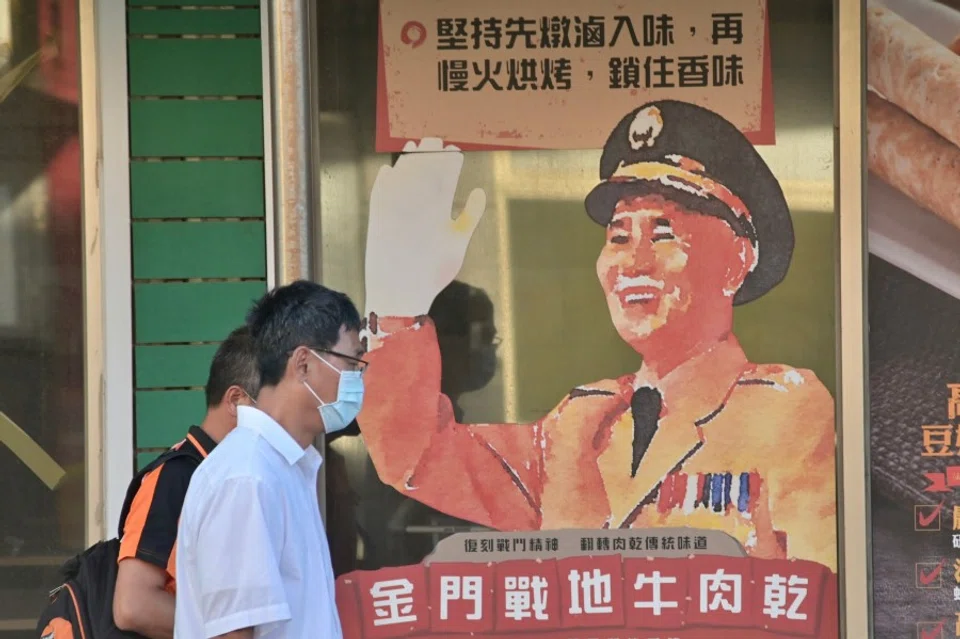KMT could still turn the tables on the DPP in Taiwan's year-end local elections
In the aftermath of US House Speaker Nancy Pelosi's visit and reprisals from the mainland, Taiwan's Democratic Progressive Party (DPP) seems to have the upper hand in the "nine-in-one" local elections that will be held at the end of the year. But the KMT could still get one up on the DPP if it employs the right strategy. Which party will play its cards right and seize the opportunities that open up?

Taiwan will hold its "nine-in-one" local elections at the end of the year. By now, Kuomintang (KMT) and the ruling Democratic Progressive Party (DPP) have largely finished planning for key elections involving the "six special municipalities" and county mayors.
In fact, the Blue and Green camps are in the battle phase, with respective candidates building their platforms based on their strengths. Besides joining forces with other parties and strengthening their base, they hope to win over more of the middle ground. But unforeseen variables will test both camps - only by controlling these variables can they hope to seize victory.
Among the risk factors for the DPP, one is the fact that local Covid-19 infections have not abated but Chen Shih-chung, the former health minister and point man on the Covid response, will be bidding for the Taipei mayorship. Another is former Hsinchu mayor and Taoyuan mayoral candidate Lin Chih-chien's scandals involving plagiarism and slipshod construction of the Hsinchu Baseball Stadium.

Credibility of DPP candidates called into question
For Chen, the outbreak of local cases in April this year broke the myth of the DPP government's declarations of planning one step ahead. What people cannot understand is the lack of masks two years ago, the lack of vaccines last year, and the lack of rapid test kits this year. It seems that the government is only plugging the gaps in the items that are lacking, while the public can only helplessly queue for masks and test kits and get vaccinated. Even though the situation has eased slightly, this anger has to have an outlet, which will definitely be a major risk for Chen.
... military exercises conducted by mainland China around Taiwan meant that the KMT's narrative could only follow the DPP's, which of course presents the greatest risk for the Blue camp's campaign.
As for Lin, his theses from Chung Hua University and National Taiwan University are said to be plagiarised or go against academic ethics. The KMT is playing up the incident, which is now snowballing. Despite clarifications from Lin and his adviser, the Blue camp has poked many holes in what they said, putting Lin on the back foot and in a position that would be hard to recover from.

Furthermore, the Hsinchu Baseball Stadium was reopened to games following a renovation of NT$1.2 billion (US$40 million), only to reveal various problems and defects, even leading to players getting injured. There was a wave of negative online comments, with players saying that the venue was as bad as a stadium in Cuba. The public anger prompted Lin to apologise on Facebook. However, this did not put the incident to rest. On the contrary, it has affected former Hsinchu deputy mayor Shen Hui-hung, who recommended Lin, and who herself is nominated to run for Hsinchu mayor, making her the biggest "victim".
KMT on the backfoot after Pelosi visit
For the KMT, the visit of US House Speaker Nancy Pelosi returned the home ground advantage to the DPP, while military exercises conducted by mainland China around Taiwan meant that the KMT's narrative could only follow the DPP's, which of course presents the greatest risk for the Blue camp's campaign. In other words, these two variables are opportunities for the Green camp.
In terms of Pelosi's visit, although the DPP kept a low profile, it could hardly contain its excitement. After all, the visit would help to promote the DPP's "internal propaganda" and add a feather to the party's cap by demonstrating the US's "rock solid" commitment to helping the island defend itself. At the same time, some attention could be diverted from Lin Chih-chien's plagiarism scandal and the flawed Hsinchu Baseball Stadium.

Meanwhile, the Chinese Communist Party's (CCP) military exercises helped the DPP to maintain its usual strategy of "resisting mainland China and protecting Taiwan" (抗中保台), while continuing to consolidate its base and expand the votes of younger Taiwanese. Coupled with its advantage of being the ruling party with easy access to resources, the DPP is well prepared to strike the enemy when the time comes.
Faced with the same variables, the KMT on the other hand faces significant risks. With regard to Pelosi's Taiwan visit and the CCP's military exercises, the KMT holds a similar stance as the DPP in terms of welcoming the visit and calling for democracy, freedom and regional peace. It also urged the CCP to exercise restraint and emphasised the importance of defending sovereignty.
Former KMT chairman Johnny Chiang even claimed that intimidating Taiwan would only worsen cross-strait relations; while Taipei mayoral candidate Wayne Chiang asked the mainland to turn back before falling into the depths of no return. The KMT's press release also urged mainland authorities to immediately cease reckless measures that would damage Taiwan's democracy, cross-straits relations and regional peace.
... if the KMT's position and comments are similar to the DPP's, voters can simply vote for the "leading brand" that is DPP - why the need to vote for a "follower brand" that is KMT?

Honestly, while these remarks are targeted at the median voters and the younger generation, if the KMT's position and comments are similar to the DPP's, voters can simply vote for the "leading brand" that is DPP - why the need to vote for a "follower brand" that is KMT?
Besides, Pelosi's Taiwan visit has also sparked conflicts within the KMT. For example, some legislators had reservations about Pelosi's visit and thought that it might "light the fuse". While this is more aligned with the position of the deep Blue camp, it runs counter to the stance of key KMT politicians such as chairman Eric Chu, Wayne Chiang and Johnny Chiang, who hope to win the support of median and younger voters.
For the KMT, internal disagreements could lead to the party losing the support of median and younger voters, or shaking the foundations of their base. Not only that, the DPP will certainly seize every opportunity to exploit divisions within the KMT. It is clear that the DPP is able to make use of Pelosi's visit and the mainland's military exercises to regain control of the elections and build a home ground advantage. In contrast, the KMT can only respond passively while attempting to quell conflicts within the party as soon as possible to avoid internal chaos. This combination of factors naturally benefits the DPP.

Recently, Andrew Hsia, vice-chairman of the KMT, led a delegation to the mainland. Even though he said that he was just there to show support for Taiwanese businessmen, to show concern for the livelihoods and well-being of the Taiwanese in the mainland, to speak up for Taiwan, and that he did not have any plans to discuss political issues, make any official arrangements or visit Beijing, his visit was made during the sensitive period of the PLA's military exercises. Thus, apart from drawing criticisms from the DPP, a petition was launched against the trip by the KMT's younger generation leaders. Undoubtedly, the KMT should seriously think about how it should properly respond to the DPP's habitual "smear them red" campaign and to different voices within the party.
With the right strategy, the KMT could even deal a severe blow to the pan-Green coalition's electoral chances in Hsinchu, Taipei, New Taipei City, and Keelung, crushing the DPP's hopes in northern Taiwan.
Still two chances to turn the tide
However, the KMT still has two opportunities to turn things around. First, National Taiwan University's Office of Academic Affairs approved the revocation of Lin Chih-chien's master's degree on 9 August in accordance with the recommendation of the university's academic ethics committee on the grounds of plagiarism. As a result, Lin has dropped out of the Taoyuan mayoral race. This has much to do with the KMT taking the moral high ground, leaving the DPP divided and many people not able to bring themselves to continue supporting Lin.
In fact, it has put the DPP in a disadvantageous position amid the fast-approaching local elections, and dealt a big blow to Taiwan President Tsai Ing-wen's reputation. With the right strategy, the KMT could even deal a severe blow to the pan-Green coalition's electoral chances in Hsinchu, Taipei, New Taipei City, and Keelung, crushing the DPP's hopes in northern Taiwan.

Second, the KMT's New Taipei City mayor Hou You-yi and Taichung mayor Lu Shiow-yen have always enjoyed high approval ratings. If these two popular and high-performing mayors are able to strongly support pan-Blue candidates across Taiwan, they could create another "Han Kuo-yu craze" like the one in 2018, and let pan-Blue candidates enjoy the spillover effects of their popularity.
In summary, Taiwan's electoral situation is changing rapidly and it is difficult to determine the winner until the results are announced. Anything could affect the strategies and voting results of both camps. The pan-Blue and pan-Green camps can only handle the situation carefully, taking advantage of opportunities and avoiding threats to increase their chances of winning.
Related: Will the great-grandson of Chiang Kai-shek be the next Taipei mayor and Taiwan leader? | Five big questions about Nancy Pelosi's Taiwan visit | The pandemic is affecting Taipei's mayoral election | Taiwan likely to become biggest loser with Pelosi's visit | Taiwan's four-question referendum results show a Kuomintang in serious decline





![[Photos] Fact versus fiction: The portrayal of WWII anti-Japanese martyrs in Taiwan](https://cassette.sphdigital.com.sg/image/thinkchina/3494f8bd481870f7c65b881fd21a3fd733f573f23232376e39c532a2c7593cbc)